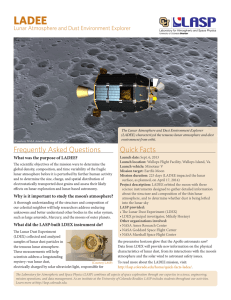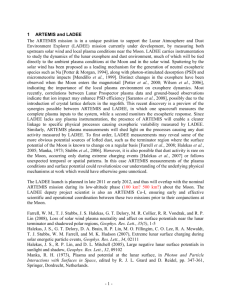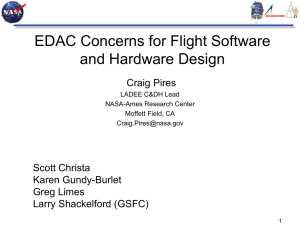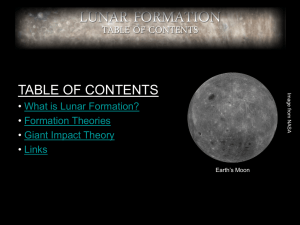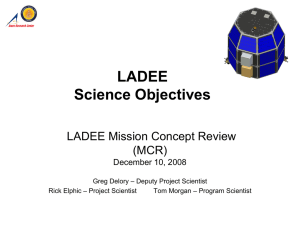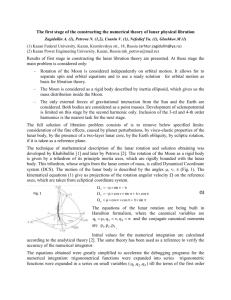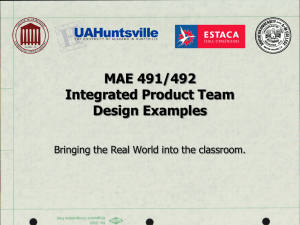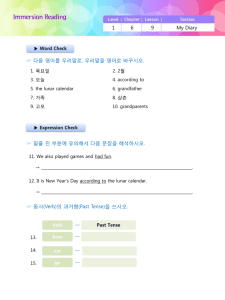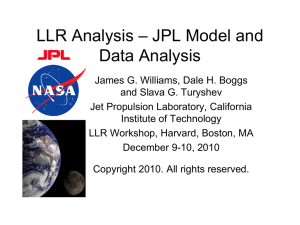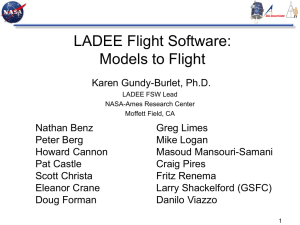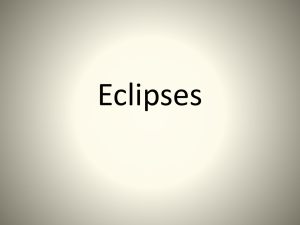LADEE moon mission
advertisement
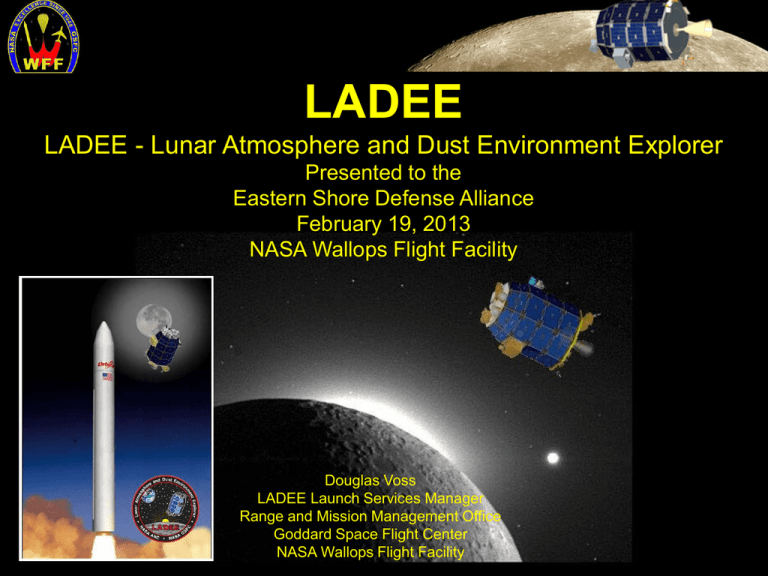
LADEE LADEE - Lunar Atmosphere and Dust Environment Explorer Presented to the Eastern Shore Defense Alliance February 19, 2013 NASA Wallops Flight Facility Douglas Voss LADEE Launch Services Manager Range and Mission Management Office Goddard Space Flight Center NASA Wallops Flight Facility LADEE The Lunar Atmosphere and Dust Environment Explorer •Determine the global density, composition, and time variability of the fragile lunar atmosphere before it is perturbed by further human activity. •Determine the size, charge, and spatial distribution of electro-statically transported dust grains. •Test laser communication capabilities. •Demonstrate a low-cost lunar mission: • Simple multi-mission modular bus design • Low-cost launch vehicle Lunar Exosphere •An exosphere’s is a tenuous, collisionless atmosphere. •The lunar exosphere is bounded by the lunar surface – a surface boundary exosphere. •Consists of a variety of atomic and molecular species – indicative of conditions at the Moon (surface, subsurface). •Wide variety of processes contribute to sources, variability, losses. Lunar Dust Building on Apollo’s experience studying the Moon’s dust. LADEE Instruments Neutral Mass Spectrometer (NMS) UV Spectrometer (UVS) MSL/SAM Heritage LCROSS heritage SMD - directed instrument Dust and exosphere measurements In situ measurement of exospheric species A. Colaprete NASA ARC P. Mahaffy NASA GSFC SMD - directed instrument 150 Dalton range/unit mass resolution Lunar Dust EXperiment (LDEX) Lunar Laser Com Demo (LLCD) HEOS 2, Galileo, Ulysses and Cassini Heritage Technology demonstration SMD - Competed instrument High Data Rate Optical Comm D. Boroson MIT-LL M. Horányi, LASP 51-622 Mbps SOMD - directed instrument Spacecraft Configuration •330 kg spacecraft mass •53 kg payload mass LADEE -Vibration Testing LADEE Mission Profile •Spacecraft final processing and fueling at Wallops. •Launches August 2013 from Wallops Flight Facility. • First mission on the new Minotaur V. • 2-3 phasing orbits to get to Moon. • Insertion into retrograde orbit around Moon. • Checkout orbit (initially 250km) for 30 days. • 100-day science mission at ~20-75km. Trajectory Overview Launch Team Science Mission Directorate - Sponsor Ames Research Center – Mission Lead Goddard Space Flight Center – Payloads Wallops Flight Facility – Launch Services USAF – Minotaur V Launch Vehicle Minotaur V 11 Min V Pathfinder Encapsulated Payload/Stage 5 Roll-out and preparation for transport to Pad 0B Stacking of Payload & Stage 5 View towards the south after gantry roll-away 12 Wallops Launch Range 13 Launch Tracking & Data TDRSS WFF Coquina, NC Bermuda V-45/55 Complex V-55 Fueling Facility •Spacecraft Fueling •Spin Balance •Spacecraft Closeout •Encapsulation in Min V Fairing V-50 Control Facility •Spin Balance Controls •V-55 S/C Fueling Monitoring •SCAPE Suiting V-45 Spin Balance •STAR-37 Spin /Bal on Gisholt 3300 •Potential Min V Stage 4 & 5 Assy. 15 15 VCSFA MARS Pad-0B Questions MOVIE A Dusty Lunar Sky? Micro-metorites as a cause of lunar dust? A new generation of robotic lunar explorers is revolutionizing our understanding of the Moon. We now recognize the Moon as a dynamic world with surficial and internal volatiles, active geology, and complex interactions with space weather. All of these could contribute to a fascinating lunar atmospheric environment. Lunar Atmosphere? •Yes, but very thin! A cubic centimeter of Earth's atmosphere at sea level contains about 1019 molecules. That same volume just above the Moon's surface contains only about 100,000 to a few million molecules. •It glows most strongly from atoms of sodium. However, that is probably a minor constituent. We still do not know its composition. Moon Dust under a Microscope Note jagged edges and shining surfaces. The latter is melted rock from micrometeorite impacts. A Dusty Lunar Sky? In 1968, NASA's Surveyor 7 moon lander photographed a strange "horizon glow“ looking toward the daylight terminator. Observations are consistent with sunlight scattered from electrically-charged moondust floating just above the lunar surface. Exospheres and Dust Surface Boundary Exospheres (SBEs) may be the most common type of atmosphere in the solar system… Large Asteroids & KBOs Mercury Moon Europa & other Icy satellites Evidence of dust motion on Eros and the Moon.... Io Eros Delory, American Geophysical Union Fall Meeting 12-16-09 Min V Pathfinder Type 2 Transporter Arrival Dual crane transfer lift Stages 1-3 GTM Arrival on Commercial Haulers An offending gate post 26 Min V Pathfinder Peacekeeper Motor Emplacement Stage 1 Break-over Stage 2 Lift Stage 3 Lift 27 Min V Pathfinder Encapsulated Payload/Stage 5 Roll-out and preparation for transport to Pad 0B Stacking of Payload & Stage 5 View towards the south after gantry roll-away 28 Spin Balance Minotaur V Launch Vehicle Taurus 92” Fairing LADEE 31.1” Interface Separation System Payload Attachment Fitting Shock/Vibration Isolation System Minotaur IV+ 38.81” Standard Interface MINOTAUR IV+ Star 37 (5th Stage) TACSAT 4 Min IV + • • Launched Kodiak Launch Center 9/29/11 Mission Success Flight Timeline 33 Stage 5 34
